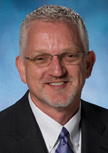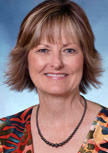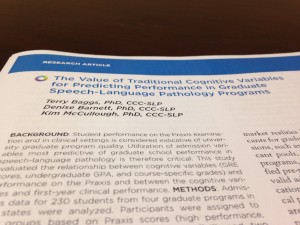The Adams Center would like to recognize faculty who have exhibited extraordinary teaching, scholarship and service. We want to congratulate faculty members for their hard work, achievements and advancements in their field. This month we are spotlighting Terry Baggs and Denise Barnett, who were nominated for their research on predicting success in graduate programs when looking at cognitive variables.
We partnered with Kim McCullough of Appalachian State University to embark on a multi-year and multi-university research project to assess the relationship between the cognitive variables commonly used in graduate admissions with a student’s success in graduate speech-language pathology. This project became the largest known project of its kind. For the independent variables, we considered overall GPA, GPA in the major, GRE scores, and science courses required by the American-Speech-Language-Hearing Association. (These courses include biological science, physical science, and speech-hearing science.) Because our secondary accreditation body gauges program success based on student’s credentialing examination, the Praxis, it was decided to utilize the Praxis score as the dependent variable. More than 200 graduate students at four universities in the mid-south and southwestern United States participated with a response rate of 97%. We found that course grades in physical science and speech-hearing science and scores on the GRE were able to predict success on the Praxis examination with a high degree of accuracy. Being part of a clinical rehabilitation profession, we were also interested in knowing if any of these independent variables were related to clinical success. We discovered a significant correlation between the quantitative score of the GRE and clinical performance. These findings were published recently in the Journal of Allied Health (JAH, 2015, 44[1], 10-16).
All rehabilitation therapies (PT, OT, and Speech) are experiencing record demand for therapists and subsequent record numbers of applications for graduate school. Admission committees talk about numbers of applicants typically in the hundreds per program for only a few openings. (We have personally experienced this at ACU. This year, our program received 227 applications for 24 openings.) Can we improve the admission process by assessing typical variables? Is it possible to make the process more efficient by assessing the predictive value of these variables? Our findings have helped us solidify our admissions process here at ACU.
Why do you think it is important to incorporate this practice into the classroom?
University graduate admissions committees have an ethical responsibility to students, potential future patients, and other constituents to admit only qualified applicants for their graduate programs. It is important to accept students who can meet the demands of academic and clinical work and pass their credentialing examination without the need for remediation. We believe that graduate admissions should not be relegated to guesswork but be grounded in an evidence base.
Who is being impacted the most?
We believe this research assists graduate programs in finding the students who will succeed academically and become an exceptional therapist. This research impacts potential students, graduate programs, and future patients who will benefit from the services of our graduates.
What hopes do you have for the future when this work is done?
Our first research project was recently published in the Journal of Allied Health. We are hopeful that many university admissions committees will benefit from our findings and will be able to advocate for modifying the process. Because of the aforementioned findings, we are embarking on a new study to assess the relationship between the SAT/ACT scores and the GRE in speech-language pathology students. We believe that early identification may assist undergraduate programs in recognizing good students who need some assistance in developing skills that will lead to acceptance into a graduate program.



